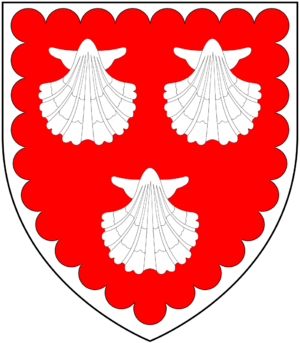Walter Erle facts for kids
Sir Walter Erle (born 22 November 1586 – died 1 September 1665) was an important English landowner and politician. He was a member of the House of Commons, which is like today's Parliament, at different times between 1614 and 1648.
Sir Walter was a strong opponent of King Charles I. He supported the Parliamentary side both before and during the English Civil War. This was a big conflict in England where the King and Parliament fought for power.
Contents
Early Life and First Steps in Politics
Walter Erle was born in 1586. His father was Thomas Erle of Charborough in Dorset. When Walter was just 11 years old, his father passed away, and Walter inherited the family estate at Charborough.
He went to Queen's College, Oxford when he was 15. Later, in 1604, he began studying law at Inner Temple in London.
In 1614, Walter Erle was chosen to be a Member of Parliament (MP) for a town called Poole. This meant he represented the people of Poole in Parliament. In 1616, he was made a knight, so he became "Sir Walter Erle." He also served as the High Sheriff of Dorset in 1618, which was an important local role.
Like many other important people in Dorset, Sir Walter was interested in new projects. He invested in plans to set up colonies in New England (which is now part of the United States). He was a shareholder in the Virginia Company, which helped establish early American colonies. He also helped start the Dorchester Company and was called the "Governor of the New England Plantation."
Standing Up to the King
Sir Walter Erle was re-elected as an MP for Poole in 1621, 1624, and 1625. He also worked as a Justice of the Peace for Dorset, helping to keep law and order.
In 1625, he became an MP for Lyme Regis. At this time, Parliament did not agree to give the King money (called "subsidies"). So, King Charles I tried to get money by forcing people to lend it to him. Sir Walter Erle was one of four men in Dorset who refused to pay these "forced loans."
Because he refused, he was called before the King's Council and put in Fleet Prison for almost a year. However, he managed to get a special legal order called a habeas corpus. This order meant that the court had to decide if his imprisonment was legal. The judges agreed that he had the right to be released. This was a very important moment because it limited the King's power to simply imprison people without a good reason.
Important Parliaments and the English Civil War
King Charles I ruled England without Parliament for eleven years. But in April 1640, he had to call a new Parliament, known as the Short Parliament. Sir Walter Erle was elected as an MP for Lyme Regis again.
After this Parliament ended quickly, Sir Walter was arrested. The King suspected him of working against him with the Scots, who England was fighting at the time.
In November 1640, Sir Walter was elected to another important Parliament, the Long Parliament, representing Weymouth and Melcombe Regis. He was chosen to help with the trial of a powerful man called Strafford. Sir Walter was supposed to prove that Strafford planned to bring an Irish army to England to stop unrest. However, he struggled to present his evidence, and this part of the case was eventually dropped. This failure might have led to Parliament using a different, faster method to deal with Strafford.
Role in the Civil War
When the English Civil War began, Sir Walter Erle became a Colonel in the Parliamentary army. In 1643, he took over an important military role, becoming the Lieutenant of the Ordnance. He was also made the military governor of Dorchester.
Sir Walter led his soldiers to attack Corfe Castle in 1643, but they were defeated after six weeks. He lost many men. When a stronger Royalist army, led by Lord Carnarvon, approached Dorchester, Sir Walter left the town by sea.
In 1645, Parliament thanked him for figuring out some secret letters. The next year, he was one of four people sent to try and make peace with the King. He continued to be an MP until 1648, when he was removed from Parliament during an event called Pride's Purge.
Later Political Life
After the Civil War, Sir Walter Erle continued his political career. He was elected as an MP for Dorset in 1654 and again in 1659 during the time England was a republic (without a king).
In April 1660, he was elected as an MP for Poole once more in the Convention Parliament, which helped bring the King back to England.
Sir Walter Erle passed away at the age of 78.
Family Life
Sir Walter Erle married Ann Dymoke. Through her, he gained some land in Warwickshire, which he later sold. His son, also named Thomas, also became an MP in the Long Parliament, just like his father. Sir Walter's grandson, also named Thomas, grew up to be a very famous general.
 | Aaron Henry |
 | T. R. M. Howard |
 | Jesse Jackson |


